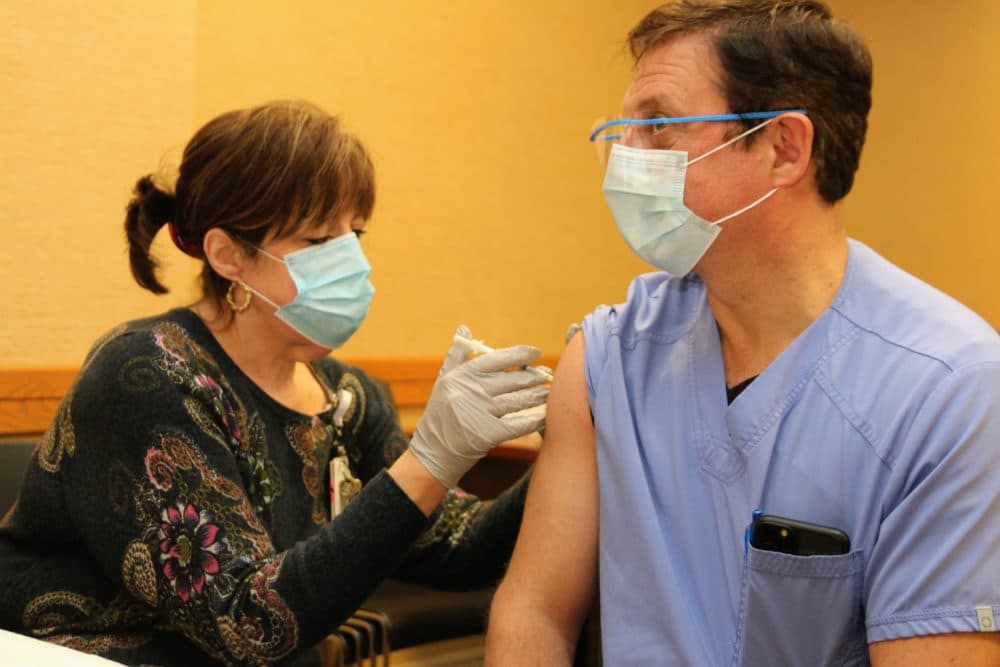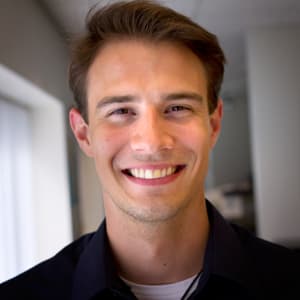Advertisement
Coronavirus Coverage
A 'Light On The Horizon': Mass. Doctor Describes Being Among The First To Receive Vaccine
Resume
Frontline health care workers in Massachusetts on Tuesday became among the first in the state to get doses of the coronavirus vaccine made by Pfizer and BioNTech.
The vaccine was authorized last week by the Food and Drug Administration for emergency use; it's the first vaccine of its kind in the U.S.
A similar one, developed by Cambridge-based Moderna, goes before the FDA for emergency authorization next week.
Dr. Dani Hackner is a pulmonologist and the chief clinical officer for Southcoast Health System, which operates hospitals in New Bedford, Fall River, and Wareham. Hackner and several of his colleagues received the coronavirus vaccine Tuesday; he spoke with WBUR's Jack Lepiarz about why he decided to get vaccinated as soon as he could.
Interview Highlights
Dr. Dani Hackner: "First off, it's a safe vaccine and we want as many of our frontline staff [as possible] to take the vaccine. And I'll be working in the ICU on Christmas Day. It's a good time for me to take the vaccine and stand with the rest of my colleagues in protecting ourselves and protecting the patients and the community ... We have a very careful prioritization of our frontline staff [for getting the vaccine], starting with our emergency department staff, our ICU staff, our nurses, doctors ... respiratory therapists in COVID areas, and then throughout the rest of the hospital's urgent care [and] testing centers. I think it's important for folks to know that the leaders are willing to do the same — get vaccinated — and believe in the vaccine."
On whether he had any hesitation:
"I do expect in the next day to have a sore arm. Maybe I'll have a low-grade fever or some achiness. So, you know, I don't look forward to that. But I know it's going to be hours, maybe a day or two, but no chance of getting the virus from the vaccine."
On the emotional impact of getting the vaccine:
"Well, it's very touching — the story of the two scientists who helped to develop this, who worked for years on mRNA vaccines — [along with] the work of all of our staff ... really with so much professionalism, so much kindness, so much calmness. And so I'm quite humbled by the staff around me. And I want to set an example, but also I want to express my thanks for being able to get the vaccine when many other folks will need to wait."
On whether anything will change in terms of how he goes about his life once he gets the second and final dose of the vaccine:
"Yes and no. So after the first dose, you see roughly about a 50% risk reduction. After the second dose, about 10 days after that, you see approximately a 90% to 95% efficacy — a 20-fold risk reduction. And so at that point, there's a great deal more safety for health care providers. But we don't have much evidence about whether folks who are vaccinated can still spread COVID. So what doesn't change is we continue to mask, we continue to use high protection when we're close to staff and patients, strong hand hygiene, personal protective equipment with COVID patients ... But once you combine the number of vaccinated individuals with the number of masked individuals, you get up to levels where you can prevent spread and prevent harm to patients and the community as a whole."
On his overriding thought as this milestone is reached:
"Well, first off, we're saddened at the numbers of lives lost. It's every week that I hear from one of our providers how they really regretted losing another life to COVID, despite everything that possibly could be done being done. It's sometimes referred to as heroic work. I don't see it as that. It's really humbling work. So it's sort of a sad time at this time in health care. But there is a light on the horizon with multiple vaccines with very good science behind them ... So a lot of mixed emotions, as, you know, someone like myself goes into work and hopes to make a small impact."
This segment aired on December 15, 2020.

